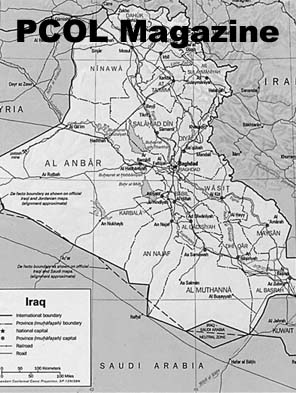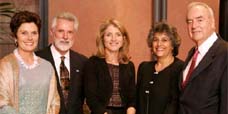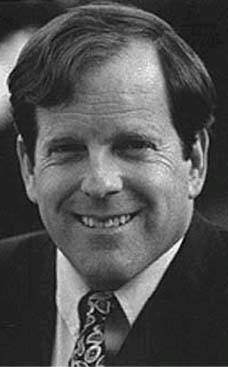
"I can't go to a family gathering—a wedding, a party—without just getting pumped for information nonstop about what's going on in Iraq and Afghanistan. It seems like people have a lot of unanswered questions, and it seems like a book that's written by someone who was there just after the conflict, in its best incarnation, has the ability to answer some of those questions," Fick says. "Maybe there's a feedback loop that these stories kind of percolate in and start to change public opinion in some tiny way."
Nathaniel Fick joined the Marines because he wanted an adventure, a "deviation from the trampled path" that was "more transformative" than the Peace Corps
Their War, Their Words
# Bookstores are filling with instant memoirs by troops fresh from the front and eager to tell us what war is like. But are they helping us understand what it means?
MICHAEL SLENSKE, Michael Slenske last wrote for the magazine about war letter archivist Andrew Carroll.
Until you've driven a humvee on a recon mission wearing nightvision goggles, which is like hitting fastballs with a microscope attached to your forehead, only exponentially harder, because even the slightest mistake, sniper fire or incoming rocket-propelled grenades can kill you and your entire crew; or unless you've sweated through 130-degree heat inside a tank, where bottled water sometimes explodes, spraying plastic shrapnel and scalding liquid in your already dripping face; or until skin falls off your feet in sheets because you've worn the same combat boots, with the same socks, for 10 days, don't pretend to know what American soldiers and Marines are going through in Iraq—unless you're willing to read their stories.
This fall marks a watershed moment in American letters. After spending 30 months and losing more than 1,900 U.S. troops in the war on terror, we're facing a new canon of battle memoirs written immediately after these troops returned home from Iraq, and in some instances during their actual tours. History and a flock of literary critics would argue that this new crop is a bit premature. Yet each of these books offers raw, unfiltered, "boots in the dirt" accounts of the war—from coping with the adrenaline rush that comes with killing people to the sexual politics of combat zones to the complexities of administering medical aid to wounded Iraqi citizens—absent all of the dispassion and disconnect of a journalist's or politician's rendering.
[Excerpt]
One of the most anticipated books from Iraq war veterans is Fick's "One Bullet Away." Blond and blue-eyed, Fick could transition seamlessly from a Marines recruitment poster to a Brooks Bros. ad. He joined the Marines because he wanted an adventure, a "deviation from the trampled path" that was "more transformative" than the Peace Corps. Fick had no intention of writing about the war as he journeyed into it. Yet when he returned from Iraq, he sensed a cultural need to know what was happening over there, and to know it now.
"I can't go to a family gathering—a wedding, a party—without just getting pumped for information nonstop about what's going on in Iraq and Afghanistan. It seems like people have a lot of unanswered questions, and it seems like a book that's written by someone who was there just after the conflict, in its best incarnation, has the ability to answer some of those questions," Fick says. "Maybe there's a feedback loop that these stories kind of percolate in and start to change public opinion in some tiny way."
That sounds a bit grandiose coming from a first-time author, but it's soon apparent that heady challenges are Fick's raison d'être. After 10 hours of meetings this August with Simon & Schuster, which is handling the audio book version of "One Bullet Away," he maintains an unfettered energy over a too-hot Indian dinner. This effervescence helps explain how Fick went straight from reading Thucydides at Dartmouth to learning "Killology" in Officer Candidate School in Quantico, Va., between his junior and senior years; how he captained Dartmouth's cycling team to an NCAA championship during his senior year; why he returned home from commanding an infantry platoon in Afghanistan to brave survival school with the Marines' elite Recon Battalion; how he transitioned from leading 23 men during the spring 2003 invasion of Iraq to studying international security at Harvard's John F. Kennedy School of Government, while at the same time writing and publishing his memoirs.
Fick doesn't want "One Bullet Away" to be "pigeonholed as an Iraq book," which might prove to be the limiting factor for some of the other warrior tomes out this fall. In many ways, "One Bullet Away" echoes Anthony Swofford's critically acclaimed 2003 memoir "Jarhead," which Swofford published 10 years after his tour during the first Gulf War. Both are literary coming-of-age accounts with strong, articulate voices that define the rigors of elite Marine training against the backdrop of a war in Iraq. They both tackle the pratfalls of drill-instructed Marines in the face of real chaos. The only glaring difference between the two is that Fick confronted Republican National Guardsmen, Saddam Hussein's Fedayeen militia and foreign jihadists in roadblock firefights and bridge-based ambushes in one of the largest-scale assaults in U.S. military history, while Swofford's experience—though brilliantly chronicled—was limited to minor skirmishes in a war that lasted just days.
"There was a cathartic element" to writing his memoir, Fick says. "There were times that I was literally crying at the keyboard, and there were times where writing it helped me get over the experience. And I know I'm not alone in that." Fick—like 70,000 other Iraq war veterans—struggled with combat stress disorder because of his war experiences, which included seeing two Iraqi boys mowed down by his battalion's gunfire.












